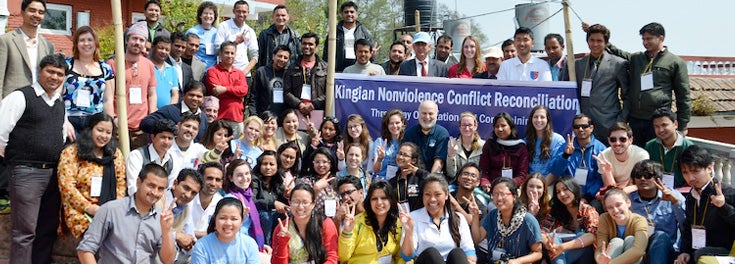
Written by communications major Marilyn Soum ’14
During Spring Break, I joined 17 other URI students on a whirlwind trip to Nepal that was as exciting as it was educational. We traveled halfway around the world with URI’s Center for Nonviolence and Peace Studies, to learn techniques for promoting peace, social justice, and transformational change in various settings and contexts. The International Kingian Nonviolence conference was led by URI’s own Psychology Professor Paul Bueno de Mesquita and a URI alumna, social justice advocate, and female rapper who goes by the name Kalyana. The training, and the whole journey, transformed me in ways I never imagined.
We all knew that we were from different backgrounds, countries, and religions, but that we all wanted to contribute to world peace, individually and communally.
Although we were all students at URI, most of the 18 of us were strangers to each other on the morning we left Kingston. By the time we returned, our shared experiences in Nepal had made us lifetime friends – not only with each other, but also with the 35 Tribhuvan University (of Nepal) students who joined us there. All 53 of us attended the three-day nonviolence training in Nagarkot, strangers with a single interest – world peace.
In one room, two totally different countries came together, talked openly, and brainstormed ideas. We envisioned how peace can be increased while hate and discrimination can be decreased. Things like religion, societal influences, and legal systems came up, but we discovered that change is subjective. As Americans, my classmates and I thought it’s about changing a concept, the law, or one another, but our Nepali friends believe it is first the change within oneself – a view that resonates with my Buddhist beliefs and practices. We all knew that we were from different backgrounds, countries, and religions, but that we all wanted to contribute to world peace, individually and communally.
My new American and Nepali friends and I didn’t just learn from each other during the Kingian training, we also hung out together outside of the conference room like neighborhood kids. We had bonfires and parties, and hiked together up the hill to watch the sun rise behind the Himalayas. For me, it felt wonderful to be around the Nepali people, because they had a different lifestyle from us, one that seemed joyous and worry-free. In our 10 days with them, fellow students who live on very little, we learned that “things” do not determine happiness. Our new friends don’t know this, but these were among the most important lessons of all.
During our week-and-a-half stay in Nepal, we toured the capital city of Khatmandu, hiked very large hills, and visited many temples and stupas including Swayambhunath also known as the “Monkey Temple.” We bartered with local merchants for the best deals, and visited Nepal’s National Park in Chitwan. Every day was different. We weren’t just in a different country; we were also in a different culture, witnessing different religions, lifestyles, and people. Each Nepali man, woman and child was unique and special in their individuality, community, or dialect, but all had the same inspiring Nepali charisma and spirit, a happiness that comes with little more than being alive.
The day we hiked up to the Namobuddha temple, we met a number of families who lived on the terraced hills. As we hiked, I didn’t see any shops and I wondered how these families could go for so many miles without having a store nearby for everyday necessities. (After all, back in Rhode Island, I run to the local Walgreens almost twice a day). In their less affluent culture, though, what was a big hike for us, was just another errand for them. We passed little boys with pierced ears walking with flip-flops through the dirt. We could see desperation in their eyes but not in their smiles. They greeted us as if we’d been long-time friends, and gave me a big hug like they were my own cousins, as if I was one of them. And that’s what I appreciated most. I think a lot of the Nepalis recognized that I was genuine; I could relate to them because of my Cambodian heritage. Being in Asia again helped me connect with my Asian culture and unite with people who have an essence like mine. A relationship like ours could not be faked.
Once strangers, my 17 new friends at URI now share the same great experiences and memories from a once in a lifetime opportunity that I will never forget. And most importantly, one that taught us that together we can spread world peace. Dunyabad (Thank You).
Pictured: Students from URI and Tribhuvan University at the site of the International Kingian Non-Violence conference in Nagarkot.
